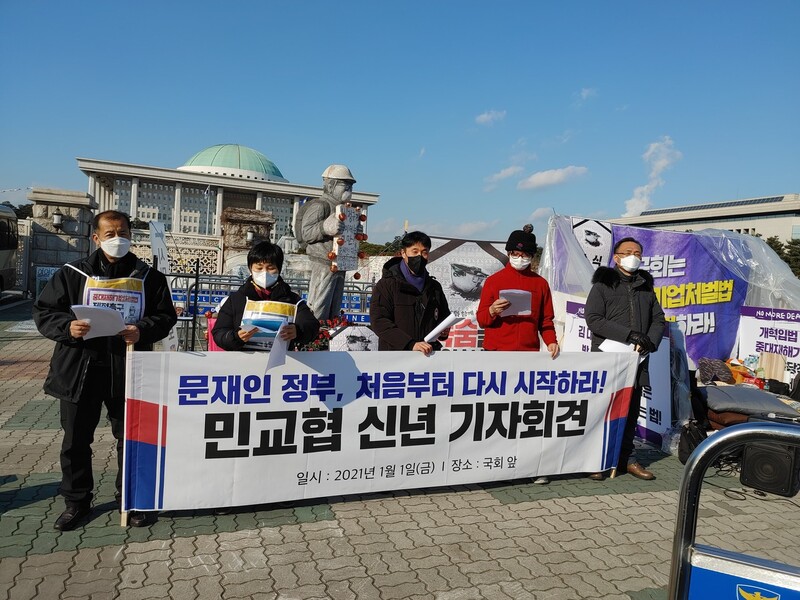Civil Relations Association cracks surface due to the motherland crisis
Anger/disappointment due to disagreement between words and actions
Overcoming this to realize a democratic and equal society
Generation, gender, and inequality
Without a keen vision, no convincing
A small number of intellectuals with stable status in the university
Most non-regular workers… Each one is also congregating
Now it’s time to set up a new movement

On January 1st, the Min-Gyo Association is holding a New Year’s press conference in front of the National Assembly. Provided by the private association
In 1987, when the enthusiasm for the democratization protest was hot, university professors also created an organization called the’National Council of Professors for Democratization’ with the aim of “democratizing the university and society.” The’Ministry’s Association’ has been a name tag representing’progressive intellectuals’ and their social movements in our society for a long time. However, it has been a long time since the ’87 regime’ has been in crisis as well as other social movement organizations. In 2019, the name was changed to “National Council of Professors and Researchers for a Democratic Equal Society,” but no significant change was detected. In 2021, such a civil society association officially announces the’Ministry’s Association 2.0 Declaration’ (declaration) and initiates innovation work. As inequality deepens and the social crisis rises, professors and researchers are required to practice for the construction of a new democratic and equal society. This is a declaration to the effect of urgently rebuilding the collapsing universities and research communities. Recently held a face-to-face interview with Kang Myung-suk (Paejae University) and Kim Jin-seok (Seoul Women’s University), co-chairman of the Minkyokyo Association, and Chun Jeong-hwan (Sungkyunkwan University) Chairman of the Academic Education Committee to hear the background of the declaration and future plans.

From left, Myeong-sook Kang, Kim Jin-seok, co-chairman of the Minkyokyo Association, and Chun Jeong-hwan, chairman of the academic education committee.
They pointed to the’country-country situation’ that emerged during the course of the appointment of the Minister of Justice Cho-guk in 2019 as an incident that surfaced the internal cracks of the civil relations association. Professors belonging to the’fatherland generation’ among the members of the civil society association voiced’supporting the motherland’ with the justification for reform of the prosecution and also engaged in collective action. However, in the later generations, “even if Professor Cho did not do anything illegal, the problem revealed by his family lies at the core of Korean education and social inequality, and it is necessary to face it” (Chun Jeong-hwan). This shows that progressive professors and researchers, who have been tied to some extent with the word’democratization’, are diversifying. Professor Kim Jin-seok said, “The situation of the motherland served as an event that revealed the heterogeneity that existed within the civil society association, while revealing the limits of the values and philosophy of the ’87 generations’. Even though professors and intellectuals are very privileged, they have become dull enough to not feel that it is a problem.” Changes in perception of identity lead to changes in orientation. The movement to add’equality’ to the existing goal of’democratization’ was added. The Declaration proposes the’realization of a democratic and equal society’ as one of its aims. “Without a keen perspective on the issues of generation, gender, and inequality, there is no persuasive civic movement nor a new democracy, I will work together” he said. They also emphasized that “the university and the intellectuals of the 87 system are not already in the real world.” In pursuing the agony and reflection as an intellectual in the past, it cannot be overlooked that a stable status and social reputation were supported. There are very few intellectuals with stable status in universities these days. Most of them are non-regular professors and researchers, and they are driven to individual students in a discriminatory structure between status and wage. The declaration pointed out that, “Some regular professors in the metropolitan area and national universities enjoy peace and power, but this is at the expense of discrimination and exploitation against irregular professors and local and female researchers.” He also pointed out the formation of new subjects such as’new, regional, female researchers, and independent researchers’ as a key task, moving away from the existing’male, metropolitan area, full-time professors’. As a concrete activity following the declaration, the KCTU is holding a’City State Debate’ at the end of this month, while also planning a series of debates on the subject of’Korean society and intellectuals’. It focuses on reinforcing the organization by creating separate groups for researchers, non-regular workers, and women, and prepares an evaluation of the Moon Jae-in government’s reform agenda and proposals for social reform agenda aimed at the presidential election. Professor Myung-Sook Kang said, “In our society, there is great anger and disappointment that people who have tried to contribute to society through words cannot show conformity with their actions. “We will try to overcome this and make sure that the researchers’ capabilities can be used properly.” By Choi Won-hyung, staff reporter [email protected]
